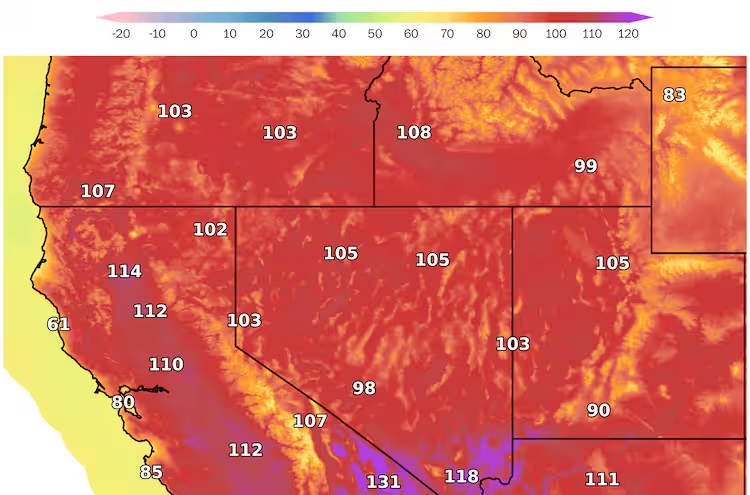Earth broke all-time heat record two days in a row, scientists say
from WaPo
Global temperatures Monday were highest ever observed — breaking a record set only 24 hours earlier.

The results from the Copernicus Climate Change Service show the planet’s average temperature on July 22 was 17.15 degrees Celsius (62.87 degrees Fahrenheit) — exceeding the previous record, set on Sunday, by more than a tenth of a degree Fahrenheit.
Even before Monday’s data had been analyzed, Copernicus director Carlo Buontempo said it was clear Earth was entering “uncharted territory.”
“And as the climate keeps warming, we are bound to see records being broken in future months and years,” he said in a statement Monday.
This week’s records come amid a hot streak of such scale and intensity scientists have struggled to fully explain it. Before July 2023, Earth’s daily average temperature record — set in August 2016 — was 16.8 degrees Celsius (62.24 degrees Fahrenheit). But in the past year, the global temperature has exceeded that old record on 58 days.
“What is truly staggering is how large the difference is between the temperature of the last 13 months and the previous temperature records,” Buontempo said.
The record could fall again within the coming days, Copernicus researchers wrote. But as the Northern Hemisphere summer comes to an end, and an expected La Niña weather pattern takes hold, the researchers expect Earth’s temperature to begin to cool.
Scientists have been tracking global temperatures only for the past few centuries. Yet there is good reason to believe that Monday was the hottest day on Earth since the start of the last Ice Age more than 100,000 years ago. Research from paleoclimate scientists — who use tree rings, ice cores, lake sediments and other ancient material to understand past environments — suggests that recent heat would have been all but impossible over the last stretch of geologic time.
The record-setting heat was felt on nearly every continent. Huge swaths of Asia sweltered amid scorching days and dangerously hot nights. Triple-digit temperatures in the western United States fueled out-of-control wildfires. Around much of Antarctica on Sunday, Copernicus data show, temperatures were as much as 12 degrees Celsius (22 degrees Fahrenheit) above normal.
According to the National Centers for Environmental Information, 613 places around the planet saw record high daily temperatures in the last 7 days alone.
The unrelenting heat has scientists increasingly convinced that this year could prove even hotter than last. In an analysis published Tuesday, climate scientist Zeke Hausfather estimated that 2024 has a 95 percent chance of setting a new annual heat record. The average temperature for the year is almost certain to exceed 1.5 degrees Celsius (2.7 Fahrenheit) above preindustrial levels — surpassing what scientists say is the threshold for tolerable warming.
“It is troubling but not surprising that we are hitting record temperatures this year,” Andrew Pershing, vice president for science at the nonprofit Climate Central, wrote in an email. “We continue to add carbon pollution to the atmosphere, so global temperatures will continue to go up.”






















